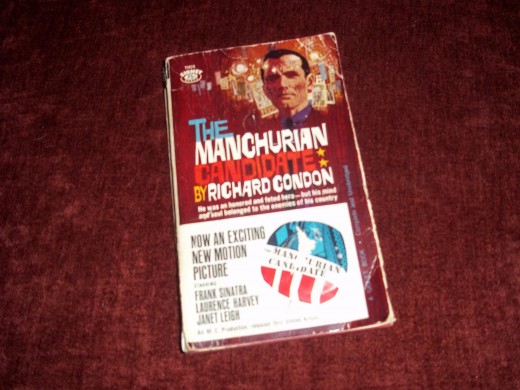Connecting the Decades: The Manchurian Candidate

Bridge Over Troubled....Decades
Originally, this was going to be a follow-up to my "Novels of the 50s" HUB, with a discussion of novels that played a key role during the decade of the 1960s. When I began organizing my thoughts, however, I realized that the first novel I planned to discuss, The Manchurian Candidate, by Richard Condon, could make a notable statement in and of itself. I doubt that any other book has shocked me with its premise and entertained me with its prose as much as this novel has.
Written in 1959 but not published until the following year, The Manchurian Candidate is a transition with an exclamation point, if you will, between the decades of the 1950s and 1960s. If the 50s were clouded by the specter of McCarthy, the 60s, then, were first brightened by the promise of Kennedy and not long after darkened by his death. This book eerily has its pulse on all of that and more.
Raymond Shaw: handsome war hero, recipient of the Congressional Medal of Honor, stepson of the man headed for the vice-presidency, intelligent enigma, protagonist....or is it antagonist? This is the stream-of-consciousness type of thinking inspired by reflection on this brilliantly drawn main character. How could a soldier in Korea be disliked by everyone except his commanding officer and manage to come home a hero? As stated near the beginning of the novel, "It was not that Raymond was hard to like. He was impossible to like." After his return from Korea, the same men who had found him "hard to like" spoke of him only in glowing terms. Perhaps that was because he had saved their lives during an enemy attack.... or did he?
At first, the reader wonders why Raymond's life is devoid of love, and why he seems to function like an automaton. That is, until it becomes clear that the first kind of love to which he was exposed had nothing to do with love at all. That changes when he falls in love with Jocelyn Jordan and she with him.... but wait. If that's the case, then why........? Eventually, questions are answered, confusing events become all too clear, and the fragmented "Raymond Shaws" come together as the last piece of the puzzle finally fits.
Almost from the beginning of the novel, the reader is given bits and pieces of that puzzle. Raymond's former commanding officer, Major Ben Marco, becomes so frazzled by recurring "dreams" that seem horrifyingly real that he requires psychiatric treatment and is relieved from his job with Army Intelligence. The reader already knows that the dreams seem so real because they're not dreams; they're memories. When Marco finally realizes the truth, he convinces his superiors of the incomprehensible, terrible nightmare in which the country is enmeshed and works with by the FBI and Army Intelligence to come up with a plan before it's too late.
Meanwhile, Raymond's manipulative mother, Eleanor, does everything possible to advance the political career of her husband, Senator Johnny Iselin. Senator Iselin is a bumbling, McCarthy-esque buffoon whose goal seems to be to keep the country safe from Communists. His predecessor in the Senate dropped dead after dining with none other than Eleanor and Johnny Iselin. Was it coincidence, or....? Nothing in this book is coincidental, not even the fact that Raymond Shaw plays a mean game of solitaire. Literally. When Chunjin, former translator for Marco's company in Korea, shows up on Raymond's doorstep, the game board seems set.... but whose move is it? And who is the game master?
The 1962 film version of The Manchurian Candidate was one of the few movies I've seen that actually did justice to the novel. Angela Lansbury, who played Mrs. Iselin, actually was only three years older than Laurence Harvey, who played her son. That made little difference; her performance was stunning. Harvey himself was a mesmerized and mesmerizing Raymond Shaw, and Frank Sinatra made a surprisingly effective Ben Marco. Some of the unforgettable scenes from the novel were cleverly and chillingly transferred to the silver screen. The 2004 movie re-make wasn't nearly as true to the novel as the original film, and, at least for me, its effect wasn't nearly as powerful.
The decades of the 1950s and '60s were marked by the threat of nuclear disaster, the fear of the Cold War, the paranoia of McCarthyism, the paternal Presidency of Dwight Eisenhower, the Camelot of the Kennedys, the harsh reality of Lee Harvey Oswald, the ongoing crisis of Vietnam, and, finally, the enigma of Richard Nixon. The Manchurian Candidate casts an eerie shadow, particularly when you realize that it was published in 1960, at "the turn of the decade."



